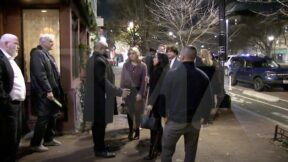Sara Haines Argues Affirmative Action is Hurting Asian-Americans in Tense Exchange on ‘The View’: ‘It’s Downright Racist’
The View discussed affirmative action on Wednesday as the Supreme Court is taking up a case related to the civil rights era policy aimed at fixing inequality in the public school system. The conversation got tense at times as co-hosts Sara Haines and Alyssa Farah Griffin argued that the approach to the policy should not be based on race alone and has in fact negatively impacted some minority groups.
Haines argued that Asian Americans are “having trouble with” a “personality rating” that has been instituted in college admissions to enact affirmation action.
“It’s, I wouldn’t even say it’s discriminatory, it’s downright racist. They’re judging them on a personality score. And if you went on just test scores, which, by the way, people think high school grades first, then standardized test scores, 43% of these elite institutions would be Asian,” Haines argued, adding:
So, the problem with the civil rights movement was to say don’t discriminate against race because discriminating hurts a race. Fixing it with the same discrimination is going to hurt some other race.
“Now, that’s. That’s not what. That’s not what happened. Let me let me explain. You know,” replied Whoopi Goldberg.
“Unless you’re saying white people are discriminated against?” interjected Sunny Hostin.
“No, no, I’m saying Asian-Americans in this instance,” Haines shot back.
“Well, here’s if you are someone who says these tests don’t really reflect us. This is what we did when we talked about the tests that were given in our American schools,” Goldberg replied, adding:
So this didn’t really reflect how I grew up. You’re asking questions I don’t have any understanding of. Right. The key, then, is to adjust what you’re doing and adjusting the standardized test. It is not stopping affirmative action because once that happens, someone can then say, well, you know, we have three Asian American students. We’ve got enough.
See they can’t do that. They can’t say, oh, we have. Well, we have three women. We can’t ten. But I think the big I’m sorry, the big picture of affirmative action, it is there to help people who would not normally be able to get in. Right. Not just on their merit, because folks who are applying to these schools had the grades, had everything, and they still weren’t accepted. I’m talking about women.
“The Supreme Court has indicated they would consider socioeconomic differences because clearly education is not equal,” Haines replied.
“The problem with that is that’s a failed experiment. In California in 1998, California passed, I believe it was called Proposition 209. It banished affirmative action,” replied Hostin, noting that the “very next year, the number of California Black and Latino first-year students plunged by nearly half at UCLA and UC Berkeley and has continued to fail precipitously since 1998.”
Watch the full clip above




